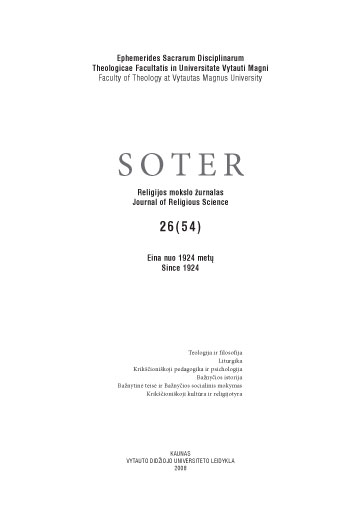Šunskai 1940–1944 m.: kraštas ir žmonės
ŠUNSKAI 1940–1944: LAND AND PEOPLE
Author(s): Kęstutis ŽemaitisSubject(s): Christian Theology and Religion
Published by: Vytauto Didžiojo Universitetas
Keywords: maža bendruomenė; karas; okupacija; kentėjimai; small community; war; occupation; suffering.
Summary/Abstract: Some generations of a small Šunskai parish community had formed their own traditions and customs. But the war, especially Soviet and Natzi occupations, turned people‘s life upside-down, contradistinguished them, set distrust among the people of Šunskai parish and its surroundings, as it happened all over Lithuania. These people went through the same losses and nourished the same hopes as in all Lithuania. But as Šunskai was rather far from bigger centers, there were no military or strategic objects, so they were not straightly affected by war actions. Šunskai people experienced holocaust during the Natzi occupation, though they avoided watching terrifying procession where they could have seen their classmates or neighbours led to shooting places because there was no Jewish community in Šunskai. The second Soviet occupation totally ruined normal life of people; their property was taken off, the search of enemies began, the Church was persecuted, people became hostile to each other, life in constant fear of Siberia exile, a partisan war started. However, the Šunskai people came through the experience of war with all its cruelties. This period made people hostile to each other, some of them went into the forest for partisan fight, others joined the so called „stribai“– armed collaborators. This fight in some years’ time turned into the fight for survival and sometimes irrational revenge on both sides. In post-war years the Soviet powers closed 12 parish and filial churches, 28 chapels; 65 Catholic priests were exiled to Siberia or persecuted in some other ways; 11 of them became martyrs or never returned from Siberia. In Šunskai the church was not ruined or closed but it became the property of Soviet powers as it was through all Lithuania. The parish priest Rev. V. Ambraziejus, though not imprisoned or exiled, but was persecuted and intimidated. In post-war time, in spite of spreading atheism in society and persecutions of the Church, the parish lived a lively and pious life. But the war and occupations destroyed the community life of a small parish, good relationship among the neighbours, neglected universal and national values, and without religious consciousness and Christian morality, the community became indifferent to religion.
Journal: SOTER: religijos mokslo žurnalas
- Issue Year: 54/2008
- Issue No: 26
- Page Range: 155-162
- Page Count: 8
- Language: Lithuanian

